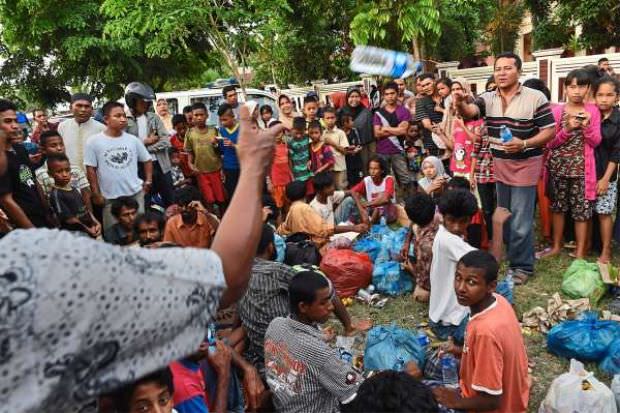SITTWE (Myanmar): As Mahmoud Yasien kneeled before the people smugglers and begged for his pregnant wife’s life, the Rohingya migrant’s dreams of a better life evaporated, his ship stranded hundreds of miles from its destination in Malaysia.
His pleas spared her life and when phone calls relayed news of their nightmare journey back to their community in a displacement camp in Myanmar’s western Rakhine state, neighbours cobbled together the cash to pay off the smugglers and buy them back from the boat.
“She was unconscious and they said they would throw her in the water. But I begged at their feet and apologised. That’s why they didn’t throw her overboard,” said the 24-year-old who arrived back in Anauk San Pya camp outside the town of Sittwe on Sunday.
His entreaties for mercy were not, however, enough to spare Bebe Nu Asha, who is eight months’ pregnant, from the beatings or starvation rations handed out by the smugglers who held them at sea for 40 days.
An estimated 2,000 other migrants remain stranded on ships off Myanmar and Bangladesh – with little food or water – as smugglers consider their next move after a Thai crackdown disrupted established trafficking routes through that country, which had long been used to funnel fleeing Rohingya to Malaysia.
The United Nations says desperate relatives are buying back some migrants from those boats for around US$300 (RM1,080) per head – stemming the smugglers’ losses after their cash-cow networks further south were pulled.
Fears for the passengers’ safety are mounting with the monsoon storms ready to lash the region.
But life in Anauk San Pya, one of a cluster of bleak sprawling camps of bamboo huts provided by overseas donors to the marginalised Rohingya, is not much better, Yasien says.
“If we went to Malaysia, we would be able to eat… We have nothing here, no job. If we get food, we will eat. Otherwise, we die,” he said.
The Muslim Rohingya are stateless and reviled by Myanmar’s Buddhist majority, who deny their estimated 1.3 million community rights by describing them as foreigners.
Some 140,000 people, mostly Rohingya, were displaced by deadly communal violence in Rakhine in 2012 between local Buddhists and Rohingya.
Food in the camps is carefully rationed, limited to staples such as rice and pulses, and suffocating restrictions prevent the Rohingya from travelling and working.
Wiry and energetic Yasien has not had a job for three years when he finally made the decision to sail to Malaysia with his wife.
Friends already settled in Malaysia had found menial work, Yasien said, achieving at least a modicum of security.
Yasien described how he and his wife took a small boat under the cover of darkness to link up with the larger ship they later found themselves stranded on – the trip was advertised as taking just a day.
“There were many boats at sea. Three boats with about four, five or six hundred (passengers) each are still waiting,” Yasien said.
Around 100 people have returned in recent days from the ships.
State authorities have begun implementing a controversial “action plan” for the blighted state, including allowing some 2,000 displaced people to build permanent homes in several areas near the camps in Sittwe.
While a total of 27,000 people are currently earmarked to be resettled, the plans suggests they will still be unable to return to their former homes and villages.
State Secretary Tin Maung Swe insisted the situation in the camps had improved, lauding the recent arrival of electricity.
“They don’t want to go anywhere. They can grow anything, they can live safely,” he said.
Residents offer an alternate view, saying conditions are dire for the Rohingya.
“If we cannot get food to eat, we will go to Malaysia again,” Yasein said. — AFP
-The Star







